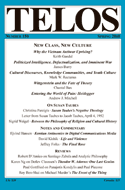As an occasional feature on TELOSscope, we highlight a past Telos article whose critical insights continue to illuminate our thinking and challenge our assumptions. Today, Emelie Whiting looks at Mark W. Rectanus’s “Performing Knowledge: Cultural Discourses, Knowledge Communities, and Youth Culture,” from Telos 150 (Spring 2010).
 Academic discourse in the twenty-first century has undergone profound transformations. With new methods of knowledge production and consumption brought about by an increase in electronic resources and databases as well as the advent of social networking, there have been widespread changes in scholarly publishing, centers of knowledge, and knowledge communities. In his article “Performing Knowledge: Cultural Discourses, Knowledge Communities, and Youth Culture,” Mark W. Rectanus provides a compelling look at the shift in the significance and acquisition of knowledge resulting from changes in the publishing industry, literary reception, and access to different kinds of information as they stand in relation to a new “pedagogy of media”—a new way of teaching and learning in our technologically advanced age. Rectanus asserts that such developments require a revised conception of what it means to acquire knowledge as well as what constitutes scholarly knowledge.
Academic discourse in the twenty-first century has undergone profound transformations. With new methods of knowledge production and consumption brought about by an increase in electronic resources and databases as well as the advent of social networking, there have been widespread changes in scholarly publishing, centers of knowledge, and knowledge communities. In his article “Performing Knowledge: Cultural Discourses, Knowledge Communities, and Youth Culture,” Mark W. Rectanus provides a compelling look at the shift in the significance and acquisition of knowledge resulting from changes in the publishing industry, literary reception, and access to different kinds of information as they stand in relation to a new “pedagogy of media”—a new way of teaching and learning in our technologically advanced age. Rectanus asserts that such developments require a revised conception of what it means to acquire knowledge as well as what constitutes scholarly knowledge.
Publishing has seen radical changes in the last twenty years. While many rising scholars use electronic resources for research and libraries spend significantly less on books, print paradoxically remains the gold standard of academic recognition. This is reflected in the modern university library. At one time one could expect to walk into a library and see scholars surrounded by piles of books; now the modern university library may house a Starbucks, with much more room dedicated to computers than to print resources. Those changes in the library parallel changes in the classroom.
One of the central matters of concern for Rectanus is the shift in knowledge acquisition from the classroom to the computer. Educators have begun to exchange (or supplement) traditional methods of teaching with digital alternatives. Professors in many disciplines can now employ the digital realm as a virtual classroom for disseminating texts, engaging in scholarly discussion, and creating knowledge communities among their students. Dialogues can now occur in online forums and class lectures have found a new place on YouTube. These developments are important because they signal a new method of learning, one that Rectanus asserts is liable to invasion by less than reliable sources. We have all heard debates over the usefulness of Wikipedia, but as the classroom shifts to the Internet and classes have their own wikis, rising scholars are faced with a fusion of the expert knowledge of the university and the lay knowledge that runs rampant on the Internet.
With the shifts from print to electronic media and from classroom to computer, it is important that we begin a new discourse surrounding the use and validity of such resources. Rectanus provides the catalyst for such a conversation by investigating what has led to these dramatic changes, where we are now, and what steps we must take as technology continues to generate new methods for education, academic recognition, and scholarly discourse.
Read the full version of Mark W. Rectanus’s “Performing Knowledge: Cultural Discourses, Knowledge Communities, and Youth Culture” at the TELOS Online website. If you are affiliated with an institution that is an online subscriber to Telos, you have free access to our complete online archive. If not, you can purchase 24-hour access to this and other Telos articles at a per-article rate. Follow the article link for more details.








